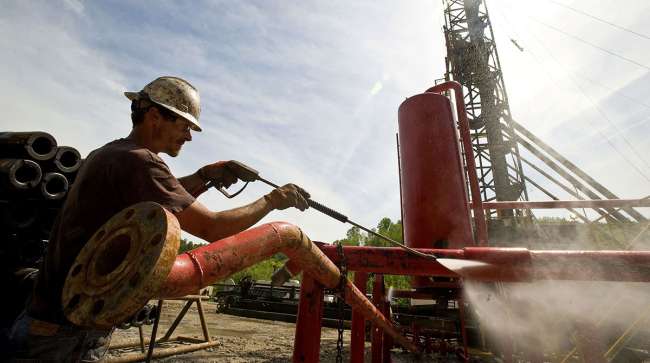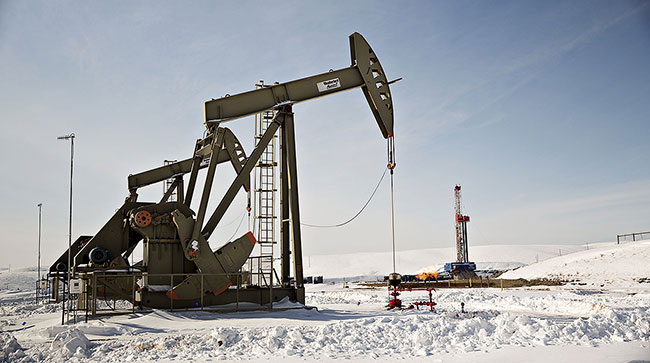Oil Executives Urge Biden to Unleash Shale

[Stay on top of transportation news: Get TTNews in your inbox.]
The chorus is growing from America’s oil executives for President Joe Biden to throw the federal government’s weight behind an industry he once deliberately shunned: U.S. shale.
The administration, which has made climate one of its policy pillars, has more than once asked OPEC+ to raise crude production to tame energy prices while at the same time declining to do so at home. Now, oil and gas executives say they can help ease the energy crisis triggered by Russia’s invasion of Ukraine, but want help from the White House first.
“This shift away from Russia will not happen overnight, and we need to be clear about that, but for it to happen at all, we need clear and consistent energy policy here in the U.S.,” Dustin Meyer, vice president of the American Petroleum Institute, said on a conference call. “Unfortunately, that’s not really what we have right now.”

A pump jack operates as a drill rig sits on a well pad in the Bakken Formation in Williston, N.D. (Daniel Acker/Bloomberg)
While critics complain the fossil fuel industry is pressing its advantage at a time of war, further price rises triggered by Russia’s invasion of Ukraine may force President Biden to reckon with how the growing urgency of energy security lines up with his climate agenda.
“We expect a change in tone from Washington,” Pickering Energy Partners said in a note to clients. The mounting crisis in Europe combined with “economy-killing high gasoline prices” are likely spur the White House to explicitly call for more U.S. production, analysts wrote.
That is something shale executives have been clamoring for.
“I’m a little mystified that there hasn’t been some dialogue,” Devon Energy Corp. CEO Rick Muncrief said earlier this week in an interview in New York.
U.S. shale has a litany of complaints with the Biden administration, from pipeline permitting to leasing, and still is producing less oil and gas than before COVID-19 struck two years ago, even though prices for both are much higher. Shareholder demands to harvest the elevated prices for dividends and buybacks is the main driver for their conservatism, but executives claim a long-term commitment from the U.S. government to back fossil fuels could unlock more capital investment in fresh production.
Liquefied natural gas is top of the agenda. Europe gets 40% of its natural gas from Russia, and the urgency to move away from relying on Moscow to power its grid is growing by the day. The U.S., which recently became the world’s biggest LNG exporter, still is helping with nearly two-thirds of its cargoes currently at sea headed to Europe, but more could be done to displace Russia long term, the industry says.
“Like in World War II and other crises, America has Europe’s back,” Mike Sommers, CEO of the API, said in a statement March 3. Biden could “move faster” on approving LNG export terminals and stop blocking financing to gas infrastructure overseas, he added.

Learn about real-world adoption strategies for self-driving trucks with Robert Brown of Spartan Radar and Charlie Jatt of Waymo. Hear a snippet above, and get the full program by going to RoadSigns.TTNews.com.
The administration frequently has pushed back on the industry’s pleas for help, arguing it’s not standing in the way of increased oil and gas production. Companies can take advantage of thousands of unused drilling permits they already have, White House National Economic Council Deputy Director Bharat Ramamurti said on Bloomberg Television. “If people want to step up to the plate and produce more, they’re free to do so.”
But that’s not exactly a ringing endorsement. And other, more serious issues remain. A Gulf of Mexico lease sale recently was invalidated by a federal court, citing inadequate climate analysis; pipeline permitting, especially in the Northeast, is fraught; and the Securities and Exchange Commission is drafting a regulation that would force public companies to disclose details about energy purchases and greenhouse gas emissions.
Privately, industry executives claim the White House’s anti-fossil fuel agenda makes investors and banks less willing to fund drilling campaigns that will only pay out years into the future, raising their cost of capital. Chevron Corp. CEO Mike Wirth said he hopes to have a better dialogue with the administration than in its early days.
Indeed, fears over energy security are growing quickly. Oil could reach a record $185 a barrel by the end of the year should buyers continue to freeze out Russian crude, JPMorgan analysts warned. In Europe, prices for natural gas futures are 10 times what they were a year ago. U.S. gasoline prices are at the highest since 2014 and reached a record peak in California on March 3.
Want more news? Listen to today's daily briefing above or go here for more info
Once the administration has exhausted its initial efforts to tame prices — namely releasing oil from government stockpiles and prodding OPEC to raise output — politicians finally may turn to U.S. producers, Citi Group Global Markets Inc. analyst Scott Gruber said in a note.
One of the key advantages of shale is that it is one of the few parts of the global oil industry that can increase production quickly, in a matter of months rather than years for large, offshore projects.
Pioneer Natural Resources Co. CEO Scott Sheffield said the oil independent is open to raising its production target as part of a “coordinated effort,” according to an interview with S&P Global Commodity Insights.
Independent U.S. shale producers already were on course to make record profits this year, even before the recent spike in oil prices to more than $100 a barrel. Earnings will reach $135 billion, a third higher than last year and nearly double 2019 levels, according to Bloomberg Intelligence.
— Written by Kevin Crowley, Sergio Chapa and Jennifer A. Dlouhy


